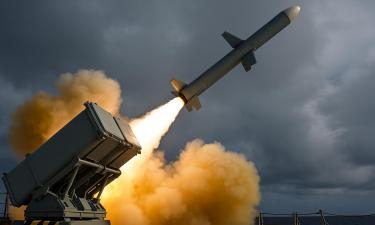Can Suicide Terrorists be Stopped?
Chechen terrorist have started sending suicide bombers to Russia's most vulnerable spot, Moscow
The Chechen war is gradually shifting to the center of Russia and becomes a purely terrorist war.
It was a miracle that two suicide bombers didn't get to the crowded concert ground in Tushino where hundreds of people might have been killed in a panic and ensuring crush. One thing can be stated for sure: such attacks will be repeated again as there are many crowded public places in Moscow vulnerable to terrorist attacks.
If it was Shamil Basayev who actually organized the campaign with participation of suicide bombers, then it is for sure that this cunning and resourceful terrorist may cause even much trouble. According to a man who under an assumed name "Mansur" was fighting together with Basayev in Abkhazia ten years ago, Shaba (this is how he called Shamil Basayev) even used hang-gliders. This means that he will employ other exotic methods of attacks if he faces problems with sending suicide terrorists to the most crowded public places.
What is the way out of this situation? First of all, it's no use to demand that Russian troops must be withdrawn from Chechnya and peace talks must be carried out with Aslan Maskhadov and Shamil Basayev.
Everyone who was in Chechnya (one of the authors of the publication was there) knows that withdrawal of Russian troops won't put an end to the war. The problems in Chechnya are the result of the Soviet breakup. In fact, there is hardly a measure that may help restore peaceful life in Chechnya similar to that one that people had in the time of the Chechen-Ingush Soviet Socialist Republic. The problem is that the present-day generation of the republic knows no other occupation other than waging a war, plundering, slave-trade, etc. When supported by finance and weapons from the outside (let's take the Saudis for example), the flame of terror may spread over into neighboring regions. It is inevitable then that separatist movements will get more active in other regions as well.
It is hardly likely that Moscow will agree to carry out military anti-partisan measures similar to those that Turks used to suppress Kurds or that Germans used in the 1940s. The reasons why Moscow won't resort to such measures are quite obvious: it doesn't want to inflame public opinion of the USA and Europe for fear of various sanctions.
Thus, today's situation in Chechnya will remain - neither war nor peace. The situation when a real war is called "an anti-terrorist operation", when the same norms as in peaceful regions are also applied in Chechnya. Terrorists can freely slaughter, kill and take hostages, but soldiers have to stand trial for these crimes. Under such conditions Chechen separatists may enjoy all rights of Russian citizens and travel about the country organizing acts of terrorism anywhere.
Right before the recent acts of terrorism at the rock concert in Tushino, President Vladimir Putin shifted the responsibility for the Chechen operation from the FSB onto the Interior Ministry. This is the authority that is said to be "incorruptible, professional and highly moral" (which is dubious indeed). So, more and more terrorist explosions may sound in Moscow very soon.
Moscow authorities are helpless to stop the flood of migrants from the south to the capital; now Moscow is turning into an eastern city with influential criminal and commercial groups consisting of people from Caucasus and Caucasus region. These groups have their followers in civil services, the police, courts and prosecutor offices. This is a highly favorable environment for creation of a terrorist infrastructure. It should be mentioned here that money earned at Moscow markets and stores serves strong support of Caucasus terrorists.
The only way to change the situation now is to employ non-traditional and ulterior methods of struggle.
We have already suggested that a specia TV weapon must be used against suicide bombers. In other words, we recommend the Russian television not to name suicide bombers and not to show consequences of terrorist acts. This is the easiest way to stop enemies from demoralizing the Russian population with the help of television. The authorities and the mass media should cooperate to be a success with it.
Unfortunately, after the recent explosions at the rock concert in Tushino (July 5) the television followed the same unhappy scheme: we learnt the name and the age of the suicide bomber, we also learnt the name of the settlement where she came from. It is perfectly evident that spreading of this information may serve wonderful support to the girl's clan and the organizers of the movement of suicide bombers. After this act of terrorism we once again saw dead bodies, blood and wounded people (it was not on that wide scale as in previous cases, but still). Does it mean that the state-run television is still working for the enemy, and the Kremlin won't alter the situation? It is terrifying to imagine what we would see on TV if the suicide bombers had managed to detonate the bombs in the thick of the crowd.
The first step now is to apply restrictions to the television that so often savors blood and violence. It's time to use the television as an information weapon against enemies of the country.
However, this is just the first step suggested, which in its turn is not the only psychological weapon. It is known for sure that starting with 1980 strong methods of influence upon the conscience of potential terrorists have been invented in the country. It is said that the conscience of potential terrorists can be allegedly influenced upon through neutral TV and radio programs. Such unconscious actions actually make people incapable of committing killings. Nothing of this kind has been done when the hostage crisis gripped Moscow in October 2002, as special services relied upon usage of gas that unfortunately caused death to many of the hostages.
May such methods of unconscious influence be applied in Chechnya or in places of arrival of migrants form the south so that people with terrorist inclinations could be identified?
However, psychology is not the panacea for all problems, as the course of military operations in Chechnya must be changed.
The war in Chechnya is now in a deadlock. The Russian army is a diseased and corrupt structure. It should at least on the surface keep the humanitarian principles pretending that there is no clan society in the republic that is why bandit methods of war are applied there. The army cannot cope with the systems of terrorist communities. At the same time it is too weak to curtail financial support of separatists (these are numerous criminal and commercial Chechen groups that control cities and markets all over the country).
Moscow itself makes the situation worse: it has created ideal conditions allowing terrorists to get back home legally and to start working in the interior departments of Ahmad Kadyrov's administration. At that these people are still connected with terrorist structures. What is more, they are supported with budgetary assignments.
It is for sure that the Russian Federation Interior Ministry, now hopelessly corrupt, won't be able to cope with terrorists alone. As for the FSB, the situation is the same: the structure has got poorer since the Soviet years and lost majority of its highly qualified specialists.
What is the way out of the situation? It is suggested that it makes sense to secretly create a separate structure controlled by the FSB. It may be conditionally called Separate Caucasus Corps. This should be a small structure, but a highly professional and wonderfully financed one; this new structure may organize secret raids and fight against terrorists with the partisan methods. It should focus on liquidation of terrorist bases and targeting them with the help of aviation. The Separate Caucasus Corps must be equipped with unmanned spy complexes; under the pretext of strengthening the aviation of Russia's south, the Corps should be given more helicopters and battle planes. Main objective of the Corps must be liquidation of separatism and its leaders.
The above mentioned ideas can be called extremism. Otherwise we'll have to reconcile ourselves to terror in Russian cities, to the war in the Caucasus that may last for decades and result in a breakup of the Russian Federation. It is quite obvious that terror will continue in this country. So, the situation resembles Karel Capek's The Salamander War where a European man was confirmed that salamander attack cities only in far-away countries. His conviction was strong until he saw a salamander getting out of a river in the center of Prague. Now we can observe such "salamanders" appearing in Moscow.
Anatoly Batashev
Maksim Kalashnikov
Subscribe to Pravda.Ru Telegram channel, Facebook, RSS!





